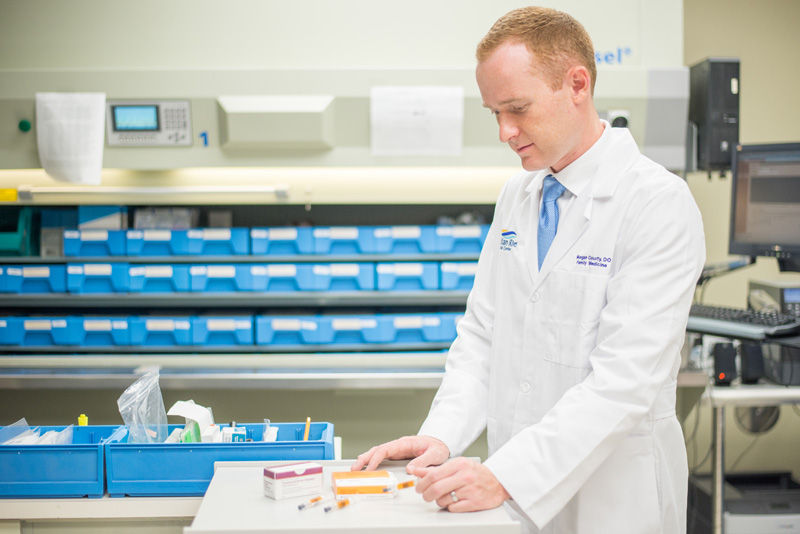School is back in session. For parents that means the mad dash for new backpacks, school supplies and their children’s immunizations is largely over.
Or is it?
The truth is there are tens of thousands of Vero area adults – including parents and grandparents – who should be getting immunizations of their own and they should be doing it now.
There are obvious ones such as flu vaccines and possibly pneumococcal or pneumonia shots, but there are others to consider, too.
For example, when was your last tetanus shot?
Don’t remember? Well, if your last tetanus shot came when George W. Bush was in the White House, you could be in for some very unpleasant shock and awe – and even lockjaw – the next time you step on a rusty nail or cut a finger. According to the National Institutes of Health, tetanus kills one in every five people it infects and the vaccine only protects for ten years.
How about pertussis or diphtheria? Is a shingles vaccine right for you?
Pfizer pharmaceutical is flooding the television airwaves promoting its new Prevnar 13 pneumonia vaccine. Should you get it? How many immunizations do you need to keep yourself and those around you healthy and happy?
Dr. Morgan Courty, a family practice physician who just started at the Indian River Medical Center’s Walk-In Care facility in Sebastian this month, and his wife, Dr. Kristine Courty, a hospitalist with IRMC in Vero, both have suggestions.
As a hospitalist, Dr. Kristine Courty sees the results of people putting off needed vaccinations first hand. She says, “The main routine vaccines for adults are Tdap every 10 years to protect against tetanus, diphtheria and pertussis; an annual influenza vaccination; the shingles vaccine for adults over age 60 and the pneumonia vaccine for adults of age 65.”
“Some adults,” she continues, “may need to get a pneumonia vaccine before age 65 if they have chronic health problems such as diabetes or COPD or are immunocompromised.”
Dr. Morgan Courty agrees adding that, “A patient’s medical history and past immunizations,” will provide needed clues as to how to best proceed, though he admits that “many [older] people don’t even think about vaccines.”
Across the street from IRMC, at East Side Urgent Care, Dr. Christopher Olenek adds a caveat and a comment on the topic of adult vaccinations.
Olenek points out that while the shingles vaccine can be very effective, it is unlike the other inoculations listed above. It is a weakened but still very much alive version of the chickenpox virus, and a small percentage of people getting the shot develop the exact symptoms they were trying to prevent
“It can,” Olenek states, “Cause shingles.”
That said, Olenek says he has had many of his senior Vero patients come in for the Tdap vaccine because of its effectiveness in preventing pertussis or whooping cough and passing it on to their grandchildren.
The Tdap vaccine also prevents diphtheria which the Mayo Clinic warns, “can damage the heart, kidneys and nervous system.”
Then there’s flu. Unlike Tdap or shingles shots, flu vaccine formulas change every year and quite frankly, some years are better than others. The 2014-2015 vaccine wasn’t a particularly good one.
According to the CDC, last year’s vaccine was just 18 percent effective in fully preventing the flu. It fared far better in reducing the severity of flu symptoms, but despite widespread use of the vaccine, more than 500,000 cases of influenza were confirmed in the U. S. last winter.
The good news? The Vaccine and Related Biological Products Advisory Committee of the World Health Organization has updated and upgraded the 2015-2016 formula that’s now available with protection for four different strains of influenza.
The CDC strongly recommends this new formula for everyone 6 months of age and older as the first and most important step in protecting against this serious, life-threatening disease.
Then there are pneumococcal or pneumonia inoculations. The most common is PPSV23 which, as its name indicates, protects against 23 different strains of pneumococcal bacteria and is generally recommended for all adults 65 or older.
If you’ve watch any TV lately, you’ve likely seen commercials for Pfizer’s “Prevnar 13” vaccine. Also called PCV13, this protects against an additional 13 strains of pneumococcal bacteria – but there is a hitch.
The Advisory Committee on Immunization Practices at the CDC warns that, the two vaccines should not be administered together. “The minimum acceptable interval,” says the CDC, “between PCV13 and PPSV23 shots is eight weeks,” and other restrictions, cautions and even advisories can also apply.
Your doctor is in the best position to provide expert guidance and offer medically sound advice on which inoculations are needed and when they should be administered.
Miranda Hawker, administrator of the Florida Department of Health in Indian River County adds that her agency also provides vaccinations.
For those without a primary care doctor, Hawker says, “adult health services are available at 1900 27th Street in Vero Beach.” The phone number is 772-794-7400. Pediatric services, including vaccinations, are available at the Gifford Health Center, 4675 28th Court, also in Vero Beach. That phone number is 772-794-7415.
Dr. Morgan Courty is with the IRMC Walk-In Care office at 801 Wellness Way in Sebastian and is now accepting new patients. The phone number is 772-581-5581.
Dr. Christopher Olenek is at East Side Urgent Care directly across the street from IRMC. Appointments are not required. The phone number is 772-770-6225.
Dr. Kristine Courty is a hospitalist at IRMC. You’re not likely to see her unless your fail to get the appropriate vaccines and need to be admitted to the hospital as a result.

